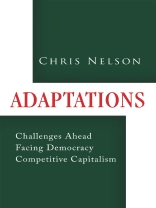This short book leads the reader on a ‘guided tour’ of some of the great issues facing us in
the 21st century, and differing views of the best way to adapt to them. Issues relating
to global warming climate change and how to respond//issues relating to the environmental limits to growth
and how to respond/displacement of workers by automation and how what to do/the high and rising debt
ratios of governments and whether to tax the rich the same as everybody else/ differing views on the role of
and need for regulation/differing views on the nature and role of democratic government (whether well run
or synonymous with inefficiency, corruption, and waste as the purveyors of Reaganomics are still pushing
on us 30 years onwards.
Pride of place among these issues must probably be given to the issue of how best to manage (i.e. slow down)
climate change. This book puts forward two original approaches for dealing with the problem, which mightt
be considerably cheaper and more easy to apply than a full scale energy transition to renewables by the whole
of the economy, especially the industrial part of it. In my humble opinion, all that is required to begin the meet
the challenge of climate change is that ‘people of good will’ be prepared to make sacrifices for the benefit
of the whole of society in meeting this challenge. My approach may be applied singly or in combination
as follows:
– Respecting the limits to growth – giving workers/employees more time off from work/more leisure time/
instead of having them produce more material goods with their inevitable by-products of greenhouse
gases emissions/pollution.
– Hastening the movement towards a non-polluting post industrial information and service economy –
accelerating and re-inforcing existing/underlying trends in the economy away from polluting goods producing
industries towards non polluting labour intensive and also skill intensive services providing. Since many
services cater to/are oriented to LEISURE time activities/passtimes/pursuits (e.g. restaurants, hotels,
resorts, and other attractions) this strategy may be viewed as a natural complement to the more
leisure time -for-all listed above. When it comes to specific industries that produce especially
greenhouse pollution intensive products would it be reasonable to expect/hope that in a case where
pollution and traffic congestion become excessively burdensome on the health and quality of life,
these industries sacrifice some of their growth/profit objectives for the good of the whole locality/
community/society by either re-locating or by diversifying their product line into less polluting/non
polluting but related products such as electric cars/and their improvements/or even moving into
comparable technology intensive areas but producing not cars but renewable energy technologies
and their applications/as well as clean up after ourselves technologies.
Over de auteur
A cat named birdie/adaptations too – Christopher Richard nelson was born on December 24, 1956 in the town of Baden-Baden, West Germany (black forest). the only son of his English father, Thomas Donald, and his German wife, Rosemarie, he lived in Canada (Ontario and Quebec), Europe (Fontainebleau, France) and the States (Colorado Springs, Colorado). A Master’s Scholar in Economic Science, Chris has worked for the federal government (NRC/Finance) before circumstances led him to take up free lance writing: ten first class/original books with emphasis on global challenges (Holistic Economic Development) and Christian vs. Worldly Value Systems and their implications for humanity’s happiness/survival (depending on peace, social justice, and stewardship of mother nature’s resources/habitats for plants and animals including man) (Pollyanna’s Hope and Adaptations). Chris also likes to write light hearted/amusing poetry about the people and pets in his life: A Single Rose Can be My Garden (with four subtitles) and A Cat Named Birdie (also including A Budgie Named Bertie).












